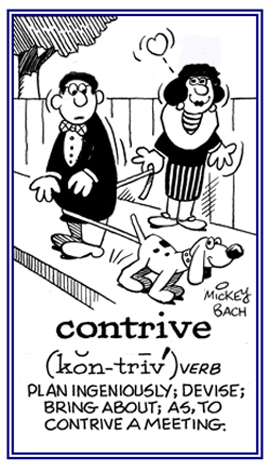2. To invent or to produce an activity in a clever or unusual way: For the theater performance in school, the students contrived a background of the presentation by using some sheets and drawing on them in order to present the illusion of a forest.
The building contractor contrived a house small enough for Ted's budget, but big enough for four people to live in comfortably.
3. To cleverly devise something; such as, a mechanism to achieve an objective; especially, by improvising or inventing, composing, or performing with little or no preparation: Janet looked in the shed to see if she could find some ropes and wood to contrive a swing for the children when they were in the backyard.
4. To plan carefully so as to seem unnatural, artificial, or forced: The plot of the novel was so contrived that it didn’t seem to be realistic at all, but quite unfeasible and difficult to understand.
5. To make a deceitful plan that is intended to avoid being noticed by others: Stuart contrived a method to cheat while taking a test at school so his teacher wouldn’t notice by writing down some answers on the palm of his hand!
6. Etymology: from Old French controver and Modern French controuver, "to find out, to contrive, to imagine"; from Late Latin contropare, "to compare", from Latin com-, "with" + tropus, "song, musical mode"; from Greek tropos, "turn, direction, turn or figure of speech" related to trope, "a turning" and trepein, "to turn".



